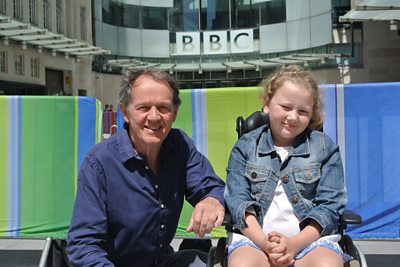Actor Kevin Whately, who is an ambassador for Action A-T with Lilly Day.
This project offers much needed hope to the families living with A-T as genome editing has the potential to become a critical therapeutic technology for both rare (genetic) and common diseases.
We would like to thank Radio 4 listeners for generously donating £11,752 to our appeal. These funds will be committed to a revolutionary gene editing study which we are funding at the Royal Holloway University of London.
The research team at Royal Holloway, led by Professor Rafael Yáñez-Muñoz will use the latest CRISPR-Cas technology to test several ways of repairing the faulty ATM gene that causes Ataxia Telangiectasia (A-T). They will initially work with easy-to-grow human cells in the lab, and then assess the most generic A-T gene repair strategies in human blood stem cells.
The study could lead to the development of personalised non-toxic therapies targeting individual A-T mutations in some cases, or generic A-T treatments in others and thereby offering essentially off-the-shelf treatments for those living with the devastating effects of A-T. Additionally, genome editing has the potential to provide a one-off therapy solution rather than administering repeated doses of chemicals with acute or chronic side effects.
Since 2012 Action for A-T have invested over £1.7million in 28 A-T related research projects globally and work closely with the research community and likeminded charities to increase our investment and maximise our impact. The charity has its own highly qualified multi-disciplinary medical advisory and peer review panel and a grant management process which has led us to achieving a best practice award from the national Association of Medical Research Charities.
You can find out more about the charity and the families who look to us for hope by visiting
